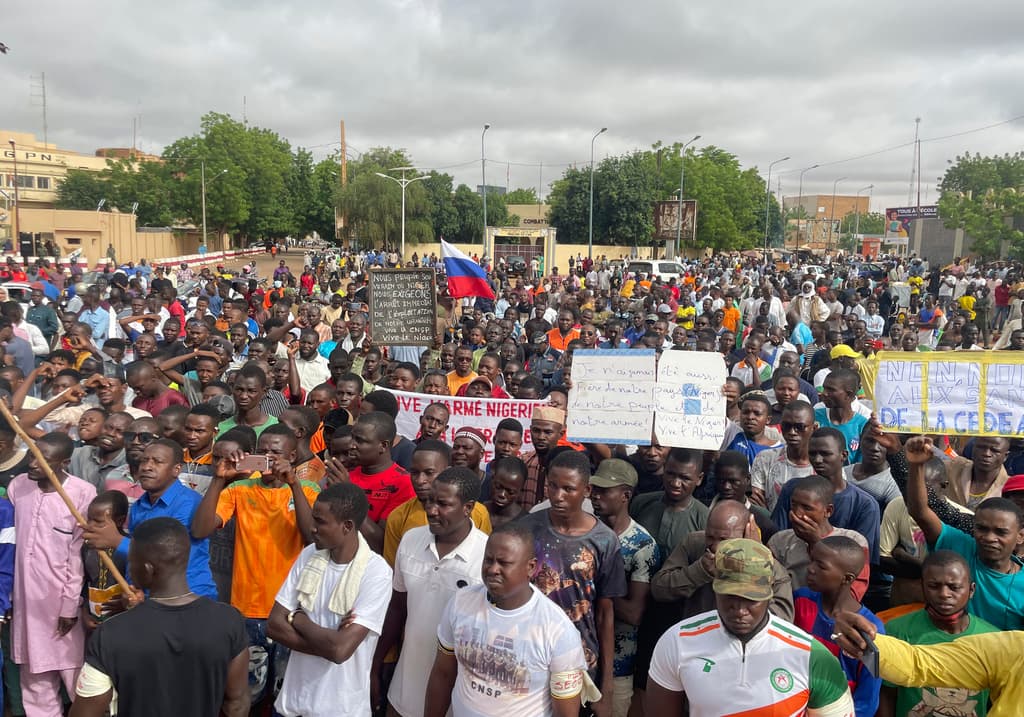Junta in Niger, Echoing the American Retreat From Kabul, Gives the Yanks Four Months To Leave Country
The new powers-that-be at Niamey have already sent France packing, and, on Biden’s watch, it appears that America will be next, while Moscow waits.

As of now there are about a thousand American soldiers deployed in Niger as part of the fight against jihadist forces in the region, but by the middle of September they will likely all be gone. The ruling junta has given Washington four months to vacate everyone from Niger Air Base 201, a $100 million drone air base that is near the remote town Agadez. It is owned by Niger but financed, and was built, by America.
The announcement came on May 19 at the capital, Niamey, after days of talks between the junta and a delegation from the Department of State. The approximately 1,000 soldiers deployed as part of the anti-jihadist fight have until September 15 at the latest to leave the base, which is used for intelligence and anti-terrorism operations in the Sahel and the Sahara.
Since a July 2023 coup d’état against the elected president, Mohamed Bazoum, things have gone south for relations between Niger and both the former colonial power, France, and America. While the split between Niamey and Washington is on the surface amicable, there is no getting around the idea that Secretary Blinken’s team at Foggy Bottom could have done better. There are uncomfortable echoes of President Biden’s hasty withdrawal of American troops from Afghanistan in August 2021 as well as of President Obama’s decision to shutter the American Embassy in Yemen in 2015.
This is even though a new agreement was signed “with complete transparency and mutual respect between the two parties,” according to a joint press release from Niger’s defense minister, Salifou Modi, and the assistant secretary of defense for special operations, Christopher Maier. Such niceties cannot mask that Mr. Biden is leaving a vacuum in the heart of a strategic region.
Last December, as the Sun reported, a Russian delegation traveled to Niamey to meet with officials from the junta, and the two parties signed an agreement about strengthening military cooperation. So it was hardly a surprise when earlier this month some American forces in Niger found themselves practically bunking with a number of Russian troops near the capital — though Secretary Austin predictably downplayed the risks such proximity inevitably entails. The hundred or so Russians were training Nigerien soldiers on anti-aircraft systems.
Niger’s prime minister, Ali Mahaman Lamine Zeine, blames Washington for this incipient rift. In March, Niamey denounced the military cooperation agreement with America that has been in force since 2012. Mr. Zeine said that American representatives had threatened the regime with sanctions if Niger agreed to sell some of the uranium it produces to Iran. He called the pressure not to do so “unacceptable.”
That pressure was not misguided. According to French news reports, some Western and Nigerien sources say that the junta has engaged in secret negotiations with Iran for the delivery of up to 300 tons of yellow cake — and not the kind used in baking.
France had been somewhat cornered by the junta’s tactics. It recalled its ambassador to Niamey and withdrew its troops in September. Washington’s exit, though definitive, will in a sense be smoother.
There is a basic need to protect soldiers at a base that is situated in an isolated area where armed groups proliferate. Also, any attack on American soldiers would create bad, Afghan-style optics for President Biden in an election year.
In the meantime, Moscow is on the move. Through its Wagner mercenary forces, now rebranded as the Africa Corps, Russia has already made a serious move on neighboring Mali by taking control of its Intahaka gold mine in April. From that mine alone Russia is thought to have extracted more than $2 billion worth of gold in the past two years.
Presumably some of that revenue is going to Russia’s coffers as it levies its war against Ukraine — not that the junta at Bamako is concerned about Europe. Its priority is to remain in power, and it leans on Russian mercenaries to do that.
Like Burkina Faso and Mali, Niger wants to leave the Economic Community of West African States. That exit will move it closer to Moscow’s commercial orbit.
The bigger strategic concern is what happens when the Africa Corps mercenaries, which is to say Russian forces, start replacing American counterterrorism forces in Niger. Despite the perceptible signs that replacement is already starting to happen, Mr. Biden seems content to cede yet more strategic ground to regional chaos.

